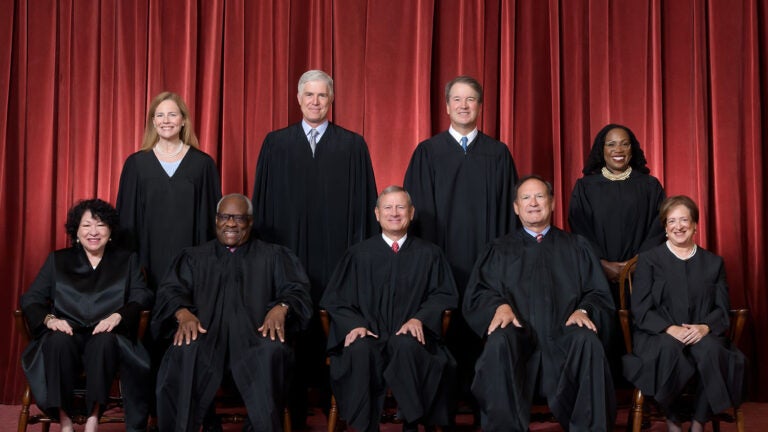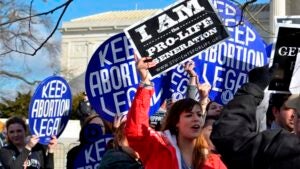
(Photo/Fred Schilling, Collection of the Supreme Court of the United States)
SCOTUS Preview: Key cases to watch and USC experts to connect with this term
The U.S. Supreme Court’s February 2024 argument session promises to tackle some of the nation’s most pressing issues, including former President Trump’s legal immunity, First Amendment protections for online speech, challenges to the EPA’s pollution control measures, and the potential future of abortion access in the United States.
USC experts are available to discuss key issues on the Supreme Court’s docket.
Contact: Nina Raffio, raffio@usc.edu or (213) 442-8464; USC Media Relations, uscnews@usc.edu or (213) 740-2215
Presidential immunity: Can Trump run in 2024?
 “The Supreme Court had to step in to clarify President Trump’s eligibility to appear on the ballot under the Fourteenth Amendment’s insurrection clause. The case raises a tangle of legal issues that place the Supreme Court in a political crossfire,” said Jeb Barnes, professor of political science at the USC Dornsife College of Letters, Arts and Sciences.
“The Supreme Court had to step in to clarify President Trump’s eligibility to appear on the ballot under the Fourteenth Amendment’s insurrection clause. The case raises a tangle of legal issues that place the Supreme Court in a political crossfire,” said Jeb Barnes, professor of political science at the USC Dornsife College of Letters, Arts and Sciences.
“The Court has not been this central to a presidential election since it decided the 2000 election in Bush v. Gore. Back then, the Court had a deep reservoir of public support. Today, its approval ratings are lagging and its legitimacy has been questioned from the left and right. Under these circumstances, there is more than President Trump’s status as a candidate at stake in this case, the standing of the Court itself is on the docket.”
Contact: barnesj@usc.edu
###
Additional Experts
Christian Grose is an expert in American government, political institutions; political representation; the politics of the policy-making process; electoral behavior and campaigns. Grose is professor of political science and public policy at USC Dornsife and the academic director of the USC Schwarzenegger Institute for State and Global Policy at the USC Sol Price School of Public Policy.
Contact: cgrose@dornsife.usc.edu
###
Lee Epstein is an expert in law and legal institutions, especially the behavior of judges. She teaches courses on constitutional law, judicial behavior, free speech and the U.S. Supreme Court. Epstein is the university professor of law and political science; and Charles L. and Ramona I. Hilliard Distinguished Professor of Law at the USC Gould School of Law.
Contact: lepstein@law.usc.edu
###
_________________________________________________________________
Freedom of speech on social media

Do state laws regulating social media content moderation violate the First Amendment rights of users? That’s the question at the heart of two landmark cases — NetChoice LLC v. Paxton and Moody v. NetChoice LLC — that will be argued jointly before the court on Feb. 24. Experts say the outcome of the cases could set a precedent for how platforms operate and users interact online, shaping everything from political discourse to misinformation control.
Erin Miller is an expert in theories of speech and free speech rights, and especially their application to mass media. She is an assistant professor of law at USC Gould.
Contact: emiller@law.usc.edu
###
Wendy Wood is an expert in the nature of habit, including behaviors that influence the spread of misinformation on social media. She is provost professor emerita of psychology and business at USC Dornsife.
Contact: wendy.wood@usc.edu
###
Morteza Dehghani is an expert political and moral language, textual and semantic analysis and morality. He is a professor of psychology and computer science at USC Dornsife.
Contact: mdehghan@usc.edu
###
_______________________________________________________________
Federal agency power and environmental protections
 The Supreme Court has signaled that it is ready to overturn Chevron deference, a decades-old legal principle that determines who decides the meaning of ambiguous laws passed by Congress — judges or the federal agency tasked with enforcing them. Experts warn this potential power shift could have major implications for environmental regulations, public health and other critical policy areas.
The Supreme Court has signaled that it is ready to overturn Chevron deference, a decades-old legal principle that determines who decides the meaning of ambiguous laws passed by Congress — judges or the federal agency tasked with enforcing them. Experts warn this potential power shift could have major implications for environmental regulations, public health and other critical policy areas.
The Court will also consider industry challenges, submitted through its fast-track appeals process or “shadow” docket, to the EPA’s “Good Neighbor” air pollution plan. This Clean Air Act rule shields downwind states from industrial pollution drifting across state lines.
“The Biden Administration is already (or should be) working on the assumption that the EPA will get no deference from the Supreme Court on any statutory interpretation issue related to climate change,” said Robin Craig, an expert in environmental law and the Robert C. Packard Trustee chair in law at USC Gould. “This is mostly relevant to the Clean Air Act, and the Court has made it abundantly clear that it is not giving the EPA any breathing room to adjust the statute to climate change realities.”
Contact: rcraig@law.usc.edu
###
Additional Experts
Clare Pastore is an expert in public interest law who has spent her career suing agencies on behalf of civil rights plaintiffs and low-income communities, which has often included litigating cases directly related to Chevron deference. Pastore is professor of the practice of law at USC Gould.
Contact: cpastore@law.usc.edu
###
Max Aung is an expert in environmental justice and an assistant professor in the Division of Environmental Health at the Keck School of Medicine of USC. Aung recently spoke about the risks of PFAS or “forever chemicals” at a press conference where California Attorney General Rob Bonta announced the state is enforcing new requirements for companies to disclose forever chemicals.
Contact: maxaung@usc.edu
###
_____________________________________________________________
Abortion pill access

For the first time since overturning Roe v. Wade and its federal protections for abortion in 2022, the justices will revisit the abortion debate through a set of new cases — FDA v. Alliance for Hippocratic Medicine and Danco Laboratories v. Alliance for Hippocratic Medicine — which will determine whether to restrict access to mifepristone, commonly known as the abortion pill.
Aya Gruber is an expert on criminal law and procedure, violence against women and critical theory. Gruber is professor of law at USC Gould.
Contact: agruber@law.usc.edu
###
Sofia Gruskin is an expert in global health, reproductive rights, and health equity. She directs the USC Institute on Inequalities in Global Health and has joint appointments at USC Gould and the Keck School of Medicine.
Contact: gruskin@usc.edu
###
Dima Qato leads interdisciplinary research efforts focusing on equity-driven drug utilization, access to medicines, and pharmaceutical policy. Qato serves as the Hygeia Centennial chair and associate professor at the USC Alfred E. Mann School of Pharmacy and Pharmaceutical Sciences. She is also a senior fellow at the USC Schaeffer Center for Health Policy and Economics.
Contact: qato@usc.edu
###
Brian Nguyen is an associate professor of clinical obstetrics and gynecology at the Keck School of Medicine. Nguyen is an expert in family planning, reproductive health and gender equity.
Contact: nguyenbt@usc.edu
###
_________________________________________________________________
Gun control, domestic violence and the Second Amendment
 The U.S. Supreme Court is poised to issue rulings in several cases with potential impacts on gun control, free speech and firearm technology. In USA v. Rahimi, the Court will consider whether a federal law prohibiting gun ownership for individuals subject to domestic violence restraining orders violates the Second Amendment right to bear arms.
The U.S. Supreme Court is poised to issue rulings in several cases with potential impacts on gun control, free speech and firearm technology. In USA v. Rahimi, the Court will consider whether a federal law prohibiting gun ownership for individuals subject to domestic violence restraining orders violates the Second Amendment right to bear arms.
Other cases incude NRA v. Vullo, which will define the boundaries of free speech for state employees and its implications for how they discuss sensitive topics like gun control in their professional capacities, and Garland v. Cargill, which will determine the legal status of bump stocks.
“Firearms are used in over half the intimate partner deaths in America. Homicide is the leading cause of death of women who are pregnant and post-partum. One in three women will experience intimate partner violence over their lifetimes. This is a life-threatening, chronic existence for many women in this country,” said Annalisa Enrile, a teaching professor and expert in violence against women, gender equity and global justice at the USC School of Social Work. “We have to start taking intimate partner violence more seriously. This is not just about upholding policies to limiting access to firearms in domestic violence cases.”
Contact: enrile@usc.edu
###
Additional Experts
Gregory Keating is an expert in torts, legal ethics, and the law of negligence as it relates to risks of death and devastating injury. Keating is the William T. Dalessi professor of law and philosophy at USC Gould.
Contact: gkeating@law.usc.edu
###
Adam Zimmerman is an expert in mass tort law whose scholarship explores how class action attorneys, regulatory agencies and criminal prosecutors provide justice to large groups of people. Zimmerman is a professor of law at USC Gould.
Contact: azimmerman@law.usc.edu
###



